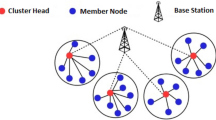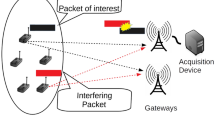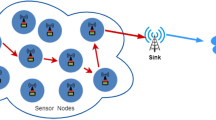Abstract
To control congestion, either the traffic from sources should be “reduced” (traffic controlling) or the available resources should be “increased” (resource controlling). Compared to the wired and other wireless counterparts, wireless sensor networks usually have elastic resource availability, and the applications require a certain level of throughput called fidelity. As a result, resource control strategies cannot only alleviate congestion but also ensure the required fidelity level during congestion by accommodating higher incoming traffic. In this paper, we first attempt to formally define the resource control framework that adjusts the resource provisioning at the hotspot nodes during congestion. In an effort to find the optimal resource control under the fidelity and energy constraints, we present a resource increase and decrease algorithm called Early Increase/Early Decrease (EIED) that tries to adjust the effective channel capacity quickly to suit the incoming traffic volume in an energy-efficient manner, thereby increasing the fidelity level observed by the application. Under the energy-constrained optimization, we prove this algorithm incurs the lowest overhead of energy consumption for the given fidelity level that is required by the application. We also prove that the EIED algorithm performed in a distributed manner also lowers the energy consumption per packet at an end-to-end level. The effectiveness of the EIED algorithm is verified by simulations based on realistic sensor network configurations.
Similar content being viewed by others
References
Cerpa, A., & Estrin, D. (2002). ASCENT: Adaptive self-configuring sensor networks topologies. In Proceedings of IEEE INFOCOM, June 2002.
Chen, B., Jamieson, K., Balakrishnan, H., & Morris, R. (2001). Span: An energy-efficient coordination algorithm for topology maintenance in ad hoc wireless networks. In Proceedings of the Seventh Annual ACM/IEEE International Conference on Mobile Computing and Networking (MobiCom 2001), July 2001.
Chiang, M. (2004). To layer or not to layer: Balancing transport and physical layers in wireless multihop networks. In Proceedings of IEEE INFOCOM’04, March 2004.
Chiu, D.-M., & Jain, R. (1989). Analysis of the increase and decrease algorithms for congestion avoidance in computer networks. Computer Networks and ISDN Systems, 17(1), 1–14.
De, S., Qiao, C., & Wu, H. (2003). Meshed multipath routing with selective forwarding: An efficient strategy in wireless sensor networks. Elsevier Computer Networks, 43, 481–497.
Ee, C. T., & Bajcsy, R. (2004). Congestion control and fairness for many-to-one routing in sensor networks. In Proceedings of ACM SenSys, Nov. 2004.
Floyd, S. (1991). Connections with multiple congested gateways in packet-switched networks part 1: One-way traffic. ACM Communication Review, 21(5), 30–47.
Floyd, S., & Fall, K. (1999). Promoting the use of end-to-end congestion control in the internet. IEEE/ACM Transactions on Networking, Aug. 1999.
Ganesan, D., Govindan, R., Shenker, S., & Estrin, D. (2001). Highly-resilent, energy-efficient multipath routing in wireless sensor networks. ACM Mobile Computing and Communications Review, 5(4), 11–25.
He, T., Krishnamurthy, S., Stankovic, J. A., Abdelzaher, T., Luo, L., Stoleru, R., Yan, T., Gu, L., Hui, J., & Krogh, B. (2004). An energy-efficient surveillance system using wireless sensor networks. In Proceedings of the ACM MobiSys 2004.
Hull, B., Jamieson, K., & Balakrishnan, H. (2004). Mitigating congestion in wireless sensor networks. In Proceedings of ACM SenSys, Nov. 2004.
Intanagonwiwat, C., Govindan, R., & Estrin, D. (2000). Directed diffusion: A scalable and robust communication paradigm for sensor networks. In Proceedings of the Sixth Annual ACM/IEEE International Conference on Mobile Computing and Networks (MobiCOM), Aug. 2000.
Kang, J., Zhang, Y., & Nath, B. (2005). Accurate and energy-efficient congestion level measurement in ad hoc networks. In Proceedings of IEEE WCNC, March 2005.
Kang, J., Zhang, Y., Nath, B., & Yu, S. (2004). Adaptive resource control scheme to alleviate congestion in sensor networks. In Proceedings of IEEE Workshop on Broadband Advanced Sensor Networks, 2004.
Lee, S. J., & Gerla, M. (2001). Dynamic load-aware routing in ad hoc networks. In Proceedings of IEEE International Conference on Communications (ICC), June 2001.
Li, B., Daneshmand, M., Wang, C., Sohraby, K., & Hu, Y. (2005). A survey of transport protocols for wireless sensor networks. IEEE Network, 20(3), 34–40.
Marina, M. K., & Das, S. R. (2001). On-demand multipath distance vector routing in ad hoc networks. In Proceedings of International Conference for Network Protocols (ICNP), Nov. 2001.
Nasipuri, A., Castaneda, R., & Das, S. R. (2001). Performance of multipath routing for on-demand protocols in mobile ad hoc networks. ACM/Kluwer Mobile Networks and Applications (MONET), 6(4), 339–349.
Pearlman, M. R., Haas, Z. J., Sholander, P., & Tabrizi, S. S. (2000). On the impact of alternate path routing for load balancing in mobile ad hoc networks. In Proceedings of ACM MobiHoc, Aug. 2000.
Ramanathan, R., & Rosales-Hain, R. (2000). Topology control of multihop wireless networks using transmit power adjustment. In Proceedings of IEEE INFOCOM’00, pp 404–413.
Sreenivas, R. S., Kumar, P. R., Narayanaswamy, S., & Kawadia, V. (2002). Power control in ad-hoc networks: theory, architecture, algorithm and implementation of the COMPOW protocol. In Proceedings of the European Wireless Conference – Next Generation Wireless Networks: Technologies, Protocols, Services and Applications, February 2002.
Sankarasubramaniam, Y., Akan, O., & Akyildiz, I. (2003). ESRT: Event-to-sink reliable transport in wireless sensor networks. In Proceedings of the ACM MobiHoc Conference, 2003.
Tilak, S., Abu-Ghazaleh, N. B., & Heinzelman, W. (2002). Infrastructure tradeoffs for sensor networks. In ACM Workshop on Wireless Sensor Networks and Applications (WSNA), Sep. 2002.
Valera, A., Seah, W. K. G., & Rao, S. V. (2003). Cooperative packet caching and shortest multipath routing in mobile ad hoc networks. In Proceedings of IEEE INFOCOM, March 2003.
Wan, C., Eisenman, S., & Campbell, A. (2003). CODA: Congestion detection and avoidance in sensor networks. In Proceedings of the ACM SenSys 2003.
Woo, A., & Culler, D. (2001). A transmission control scheme for media access in sensor networks. In Proceedings of the Seventh Annual ACM/IEEE International Conference on Mobile Computing and Networking (MobiCom 2001), July 2001.
Wu, K., & Harms, J. (2001). Performance study of a multipath routing for wireless mobile ad hoc networks. In Proceedings of IEEE International Symposium on Modeling, Analysis and Simulation of Computer and Telecommunication Systems (MASCOTS), February 2001.
Yan, T., He, T., & Stankovic, J. A. (2003). Differentiated surveillance service for sensor networks. In Proceedings of the ACM SenSys 2003.
Ye, F., Zhong, G., Lu, S., & Zhang, L. (2003). PEAS: A robust energy conserving protocol for long-lived sensor networks. In Proceedings of the 23rd International Conference on Distributed Computing Systems, May 2003.
Ye, W., Heidemann, J., & Estrin, D. (2002). An energy-efficient MAC protocol for wireless sensor networks. In Proceedings of IEEE INFOCOM’02, June 2002.
Ye, Z., Krishnamurthy, S. V., & Tripathi, S. K. (2003). A framework for reliable routing in mobile ad hoc networks. In Proceedings of IEEE INFOCOM, March 2003.
Yi, Y., & Shakkottai, S. (2004). A hop-by-hop congestion control over a wireless multi-hop network. In Proceedings of IEEE INFOCOM’04, March 2004.
Zheng, R., & Kravets, R. (2003). On-demand power management for ad hoc networks. In Proceedings of IEEE INFOCOM’03, March 2003.
Author information
Authors and Affiliations
Corresponding author
Rights and permissions
About this article
Cite this article
Kang, J., Zhang, Y. & Nath, B. An optimal resource control scheme under fidelity and energy constraints in sensor networks. Wireless Netw 15, 497–512 (2009). https://doi.org/10.1007/s11276-007-0065-2
Published:
Issue Date:
DOI: https://doi.org/10.1007/s11276-007-0065-2




